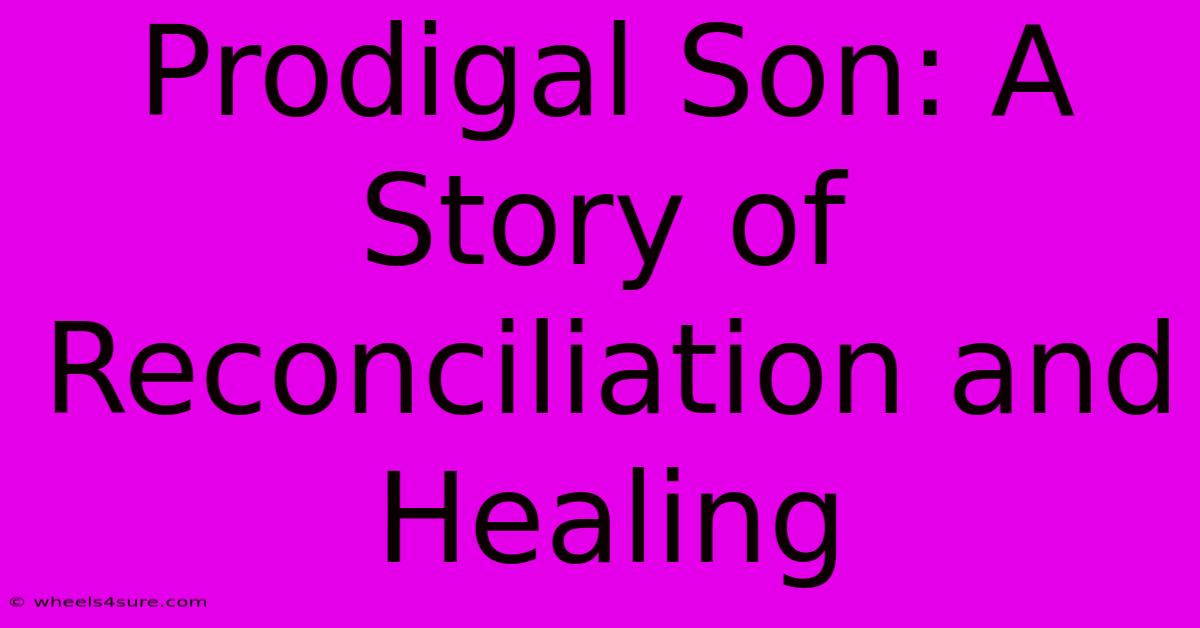Prodigal Son: A Story Of Reconciliation And Healing

Table of Contents
Prodigal Son: A Story of Reconciliation and Healing
The parable of the Prodigal Son, found in Luke 15:11-32, is more than just a religious story; it's a powerful narrative exploring themes of reconciliation, healing, forgiveness, and unconditional love. Its enduring relevance lies in its ability to resonate with the human experience of making mistakes, facing consequences, and ultimately finding a path back to belonging. This exploration delves into the deeper meanings of the parable and its implications for our own lives.
Understanding the Parable's Key Players
The story centers around three key figures:
-
The Prodigal Son: This character represents the individual who makes a significant mistake, squanders his inheritance, and experiences the harsh realities of his choices. He embodies the universal human experience of rebellion, self-destruction, and the eventual yearning for redemption. His journey is one of self-discovery, humility, and acceptance.
-
The Father: The father in the parable is a symbol of unconditional love and forgiveness. He represents the unwavering grace and compassion that are often extended to those who have strayed. His actions highlight the power of empathy and the willingness to embrace those who return, regardless of their past transgressions. His patience and understanding are crucial to the story's message.
-
The Older Brother: The older brother often gets overlooked, but his character is equally important. He represents the feelings of resentment, jealousy, and perceived unfairness that can arise when others receive forgiveness that seems undeserved. His reaction challenges us to consider the complexities of forgiveness and the potential struggles within families.
The Journey of Reconciliation
The Prodigal Son's journey is one of significant stages:
-
Rebellion and Departure: He demands his inheritance and leaves home, seeking independence and self-gratification. This represents a common human experience of pushing boundaries and searching for identity.
-
Waste and Despair: The son squanders his wealth, faces hardship, and falls into despair. This stage highlights the consequences of poor choices and the painful reality of self-destruction.
-
Return and Humiliation: The son's return is a humbling experience. He acknowledges his mistakes and seeks forgiveness, recognizing his worthlessness and unworthiness of his father's love.
-
Forgiveness and Acceptance: The father's overwhelming love and immediate forgiveness are central to the story. This act showcases the power of unconditional love and the possibility of second chances.
-
Healing and Restoration: The story's ending depicts the restoration of the relationship between father and son, signifying healing and the possibility of a new beginning. This points towards the restorative power of forgiveness and the opportunity to rebuild broken relationships.
The Power of Unconditional Love
The parable's central message revolves around unconditional love. The father's love for his son is unwavering, regardless of the son's actions. This type of love is transformative; it offers a path to healing and restoration even in the face of significant failures. It is a love that doesn't require earning, but rather extends freely and generously. This message is essential for understanding the power of forgiveness and the capacity for human relationships to transcend mistakes.
Lessons for Today
The Prodigal Son's story continues to resonate because its themes are timeless and universal. We all make mistakes, we all experience times of struggle and despair, and we all yearn for acceptance and belonging. The parable teaches us the importance of:
- Forgiveness: Both giving and receiving forgiveness are crucial for personal growth and healing.
- Second Chances: Everyone deserves the opportunity for redemption and a fresh start.
- Unconditional Love: The power of love that transcends mistakes and imperfections is transformative.
- Family Reconciliation: The importance of maintaining and restoring strong family relationships is vital for well-being.
The parable of the Prodigal Son is a powerful reminder of the transformative power of reconciliation and healing. Its message is a beacon of hope, offering a pathway to forgiveness, redemption, and restoration of broken relationships. It encourages us to embrace compassion, empathy, and the possibility of second chances – both for ourselves and for others.

Thank you for visiting our website wich cover about Prodigal Son: A Story Of Reconciliation And Healing. We hope the information provided has been useful to you. Feel free to contact us if you have any questions or need further assistance. See you next time and dont miss to bookmark.
Featured Posts
-
The Rise Of Mark Carney Wealth And Influence
Apr 03, 2025
-
Michael Sheens Net Worth A Case Study In Success
Apr 03, 2025
-
The Power Of The Microbiome Understanding Que Son Las Bacterias
Apr 03, 2025
-
Unlocking The Secrets To Adam Sandlers 2025 Net Worth
Apr 03, 2025
-
Breaking Bad Was Walt Responsible For His Sons Fate
Apr 03, 2025
